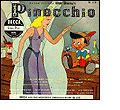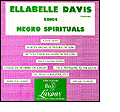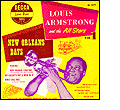With John Rabe
August 27th, 1997
|
| RealAudio 2.0 14.4 - RealAudio 3.0 28.8 |
Hart's Record store was open in Saint Paul until 1952, when owner Hart Callender closed the doors because of health problems. But he always planned to re-open it, and he held onto all his merchandise until he died last year, never letting that faint hope die. That merchandise - including 200,000 unopened records, some record players, and radios - spent years in storage. Pop music historian Arne Fogel wandered through the collection before it was dismantled in an auction August 30 and 31, 1997.
 Audio: "The Old Music Box" from Pinocchio
Audio: "The Old Music Box" from Pinocchio
RealAudio 3.0 28.8.
Click on album covers for larger view.
Fogel: There's something about the feel. It's a very, very sensual thing practically - the feel and the look of records. Vinyl, shellac, whatever. If you have that interest - not just in the music, but in the medium that carried the stuff - you can't resist.
Audio: Music
MPR: Well, that's kind of what we're talking about: opening up an old music box and hearing that evocative tune from years gone by.
Fogel: You know, it's hard to remember those days before home video when any kid could sit down and watch, WATCH Pinocchio,the actual features. But in the days when this was made, this was actually before soundtrack albums came out. They would get as much of the original cast as they could into the recording studios - in this case the Decca Studios - and recreate much of the music from musical films or from children's films like Pinocchio. And this is as close as a kid would get in 1949 to being able to re-live the film experience. Listen to this record and hear Jimminy Cricket sing a reasonable facsimile of the way he sang the song in the film.
MPR: So, Arne Fogel, back to your trip to the old warehouse where the inventory from the old Hart's record store is stored. What was that like walking through those doors?
Audio: Destination Moon RealAudio 3.0 28.8
 Fogel: Imagine the entity: the type of thing that you, dear listener, are most
interested in and seeing stacks and stacks of those things in a room, just
hitting you like a wall. Well, first of all, it was an old very, very, hot,
stuffy, sweaty warehouse. This is not where the auction going to be, but where
they have been stored.
Fogel: Imagine the entity: the type of thing that you, dear listener, are most
interested in and seeing stacks and stacks of those things in a room, just
hitting you like a wall. Well, first of all, it was an old very, very, hot,
stuffy, sweaty warehouse. This is not where the auction going to be, but where
they have been stored.
So the first thing is that heat gets you - the kind of dustiness, the mustiness, and then you sort of rub your eyes and you open them up and take a good look and you see stacks and stacks and stacks of records - stacked way higher than me - and things around your feet and around your arms and the very claustrophobic feeling of being around a lot of records, old records.
But they're not old records, they're new records. They're new, old records. It's kind of like being in the Twilight Zone when all of a sudden the guy wakes up, opens his eyes and sees everything just as it was 40 years ago, or when he was a little boy. He's in a different world of old things but they're appearing as if new.
Audio: Music (Ella Belle Davis "Were you There,") RealAudio 3.0 28.8
 MPR: Soprano Ella Belle Davis singing "Were you There," from one of the
thousands of records in the Hart's record store collection.
MPR: Soprano Ella Belle Davis singing "Were you There," from one of the
thousands of records in the Hart's record store collection.
Fogel: Pretty incredible. One of the amazing things about this is [that] it messes your mind to think about how these folks are going to sell this stuff, and what the market is going to be for it because there is no reliable Bible of information as to current value of 78 rpms that aren't old.
Once again, and I have maybe a couple of different guidebooks that list the value of 78s, but it's all based on the fact that the records that are being described are assumed to be used.
MPR: And it can be good, or fine or very good, but never untouched, unsold, new, unseen.
Fogel: And that's what's such a crazy thing about it all. As Mr. Englund, who led me through the warehouse said, "This is going to be anybody's guess as to how these lots are going to go."
MPR: Let me run something by you. You and I are not rich men. We might go to a garage sale or an estate sale with maybe 50 bucks in our pocket, and it's really fun to find something that maybe is $10 - an old radio that's maybe $10 or $20 and it's kind of a steal, but it's not too much of a steal. And I feel the same way if I go into an old record store, like there's one up in Duluth with an old guy who runs it - I'm sure you know the one. And I think it's fun to go and buy a record or two, and the prices are really reasonable, and maybe they're rare records, they're pretty cool records.
But sometimes, store owners from down here or other cities will go up there and buy a bunch of stuff, and it's almost like they're taking advantage of this situation, and I wonder if at this auction, there's going to be people with lots of bucks buying up all this stuff just so they can make a killing, not because they want to feel the vinyl in their hands.
Fogel: I'm sure. I'm absolutely sure. My experience is limited with the notion of auctions and how they operate and how they work, but what little experience I have is such that that is a tremendous factor.
Audio: music (Louis Armstrong and The All Stars' "New Orleans Function") RealAudio 3.0 28.8
 Fogel: Everything in there is as a record retailer would have stocked in that time. Whatever older records before the early '50s, late '40s are in
there are such that there would be a demand for in 1949, 1950. In other words,
it's not only a beautiful chance to acquire some old stuff, but it's just a
wonderful opportunity to see the state of the music marketplace in the
mid-century.
Fogel: Everything in there is as a record retailer would have stocked in that time. Whatever older records before the early '50s, late '40s are in
there are such that there would be a demand for in 1949, 1950. In other words,
it's not only a beautiful chance to acquire some old stuff, but it's just a
wonderful opportunity to see the state of the music marketplace in the
mid-century.
Audio: Music
Arne Fogel is a pop music historian. The Hart's record auction was held at Smith's Auction Gallery in East Bethel on August 30 and 31, 1997.
